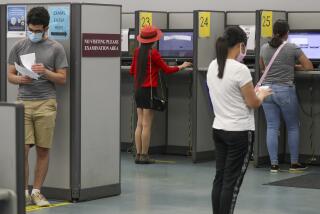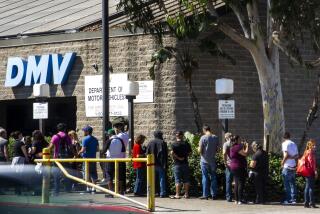13 Take First Residency Test--and Pass Handily
- Share via
SAN JOSE — First-in-the-nation tests for permanent residency were administered Tuesday by federal officials to aliens entering Phase II of the amnesty program.
All 13 candidates taking the initial test--nine from Mexico, two from India and one each from El Salvador and Nicaragua--passed with flying colors, immigration officials said.
The 15-question multiple-choice tests, emphasizing English-speaking “survival skills,” will be standardized throughout the nation by mid-January, said Harold Ezell, Western region commissioner of the Immigration and Naturalization Service.
“We think that probably 200,000 to 300,000 will take this test in California alone in 1989,” Ezell said. “Nationally, there may be as many as 500,000. It’s not tricky and not hard, but it’s fair. It fulfills what the Congress is after and what we’ve got to do to implement that part of the law.”
A score of nine right answers is required to pass; all of the first candidates correctly answered 14 or 15, the Immigration Service said.
To qualify for the tests, the aliens must register with the Immigration Service and show that they have been in the United States since before January, 1982. If they pass, the applicants receive slips that they can attach to their applications for full citizenship.
The document means they may legally remain in the country for 18 months, during which they are interviewed and issued permanent resident cards. The cards are good for five years, after which the resident may apply for U.S. citizenship.
There are five versions of the 15-question test, which asks such basics as: “What city is the capital of the United States,” Ezell said. Aliens may take the proficiency test as many times as they want, he added.
If their English skills are so low that they are unable to pass the test, they may enroll in an educational program that features 60 hours of classroom work.
If they complete 40 hours of instruction, they may receive the residency card without taking the test, Ezell said.
More to Read
Sign up for Essential California
The most important California stories and recommendations in your inbox every morning.
You may occasionally receive promotional content from the Los Angeles Times.










